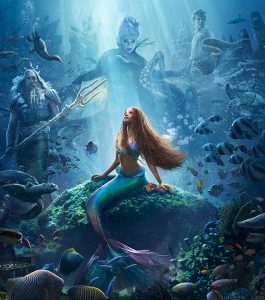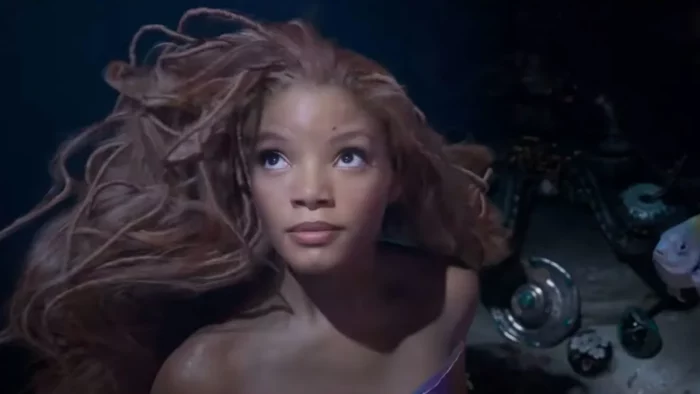Movie Review: Halle Bailey shines in live-action reboot of Disney’s ‘The Little Mermaid’
Reviewed by Jeffrey Sanzel
Live-action adaptations of Disney cartoons have become commonplace. Cinderella, Aladdin, Dumbo, Mulan, Peter Pan and Wendy, and The Lion King have been reviewed in this paper. Unfortunately, the results have been predominantly tepid.
The Little Mermaid (1989) remains the gold standard for the cartoon musicals of Disney’s animated renaissance. Written and directed by John Musker and Ron Clements, the film was funny, imaginative, and beautifully designed. The Alan Menken – Howard Ashman songs remain the strongest in the Disney canon, and the film received two Academy Awards: Best Original Score and Best Original Song (“Under the Sea”). The first-rate voice talent included Jodi Benson (Ariel), Christopher Daniel Barnes (Prince Eric), Pat Carroll (Ursula), Kenneth Mars (King Triton), and Samuel E. Wright (Sebastian, the crab). The film became the first animated feature to earn over $100 million.
 The 2008 Broadway musical, with a book by Douglas Wright, limped through a year-and-a-half run but found more success in regional, community, and school productions. In 2019, The Wonderful World of Disney broadcast The Little Mermaid Live, an interesting hybrid, where the film was projected and interwoven with live musical performances.
The 2008 Broadway musical, with a book by Douglas Wright, limped through a year-and-a-half run but found more success in regional, community, and school productions. In 2019, The Wonderful World of Disney broadcast The Little Mermaid Live, an interesting hybrid, where the film was projected and interwoven with live musical performances.
The source for the various Mermaids is Hans Christian Andersen’s 1836 Danish fairy tale. No incarnation considers the tale’s more serious elements, which focus on the nature of the soul building to a moral of redemption. Andersen’s tale ends with the mermaid’s death and ultimate spiritual transcendence, reflecting a more religious denouement. The Disney interpretation is far more prosaic, focusing on earthly love based on (mostly) physical attraction, and struggles to find a message of empowerment. The narrative is one of sacrificing everything—including your voice—for the love of a man you do not know.
Now Broadway director-choreographer Rob Marshall (who helmed the first-rate Chicago film) directs David Magee’s live-action adaptation, a revision of the Clements-Musker screenplay, swollen to 135 minutes, a full 52 minutes over the 1998 running time. The extended length is the major cavil in an otherwise effective film.

Once again, Ariel is one of the seven daughters of Triton, ruler of the sea. She is fascinated by the world above: “I wanna be where the people are,” sings Ariel in the anthem “Part of Your World.” She becomes entranced by Prince Eric, who she sees onboard a ship that runs afoul of a storm. She saves him, falling in love with the handsome young man. When her father learns of her feelings, his rage drives him to destroy her collection of human artifacts. Distraught, Ariel makes a deal with Ursula, the sea witch. In exchange for her voice, Ariel will be given legs and three days to make Eric fall in love and kiss her. If she fails, she becomes a prize addition to the sea witch’s nightmarish garden.
The story follows the earlier version, with additional background and minor adjustments. It is twenty-one years since the royal family rescued Eric from a shipwreck. Unlike his late adopted father, the king, Eric wants to be a ruler for and among the people and venture beyond the island. In addition, there is a clear suspicion between the land and sea dwellers. The queen is vocal in her distrust of the “sea gods.” Both communities blame the other for the damage of shipwrecks. The political overtones resulting from this friction is lost for most of the film, only to return at the end.

A scene in the marketplace demonstrates the joy of legs/feet/dancing (and an opportunity for a cameo by original Ariel Benson). Additionally, Ursula is Triton’s younger sister, upping the revenge quotient. One major—and welcomed change: as part of the spell, Ariel forgets that she must kiss Eric. This enables a more organic growth of their love.
Most of the new Mermaid follows the original, often shot-for-shot, and here it succeeds best. The shortcomings are few: Truncating both “Poor Unfortunate Souls” and “Kiss the Girl” is disappointing, and the few new songs (written with Lin-Manuel Miranda) add little. The creation of Ariel’s crab, bird, and fish cohorts have an odd flatness, but eventually one gets used to them.
Marshall makes the musical highlight, “Under the Sea,” less whimsical but joyous in a new way. The director utilized Alvin Ailey dancers as templates for creating this photoreal experience. (Much of the film hovers between Jacques Cousteau and CGI.)

Halle Bailey is a luminous Ariel. With a beautiful voice and a knowing presence, she elevates and dimensionalizes the mermaid. Whether singing or just communicating with her eyes, each moment and every gesture ring true. She is a worthy addition to the pantheon of princesses. Jonah Hauer-King makes for a pleasant, if mild, Prince Eric. Given the strength of Bailey’s Ariel, this seems intentional. Melissa McCarthy, channeling Pat Carroll, is a triumph, perfectly balancing traditional Disney villainy with contemporary side comments. Javier Bardem appropriately broods as Ariel’s frustrated father, lending a Tevye quality to his Triton.
Noma Dumezweni, as the newly introduced Queen Selina, seems like a benign refugee from Bridgerton; however, Dumezweni is a strong actor and brings warmth and strength to her limited role. Art Malik humanizes Grimsby, Eric’s keeper and confidant. Daveed Diggs’ delightful Sebastian offers a less neurotic but highly entertaining crab. Awkwafina finds a new and fun approach to the chatterbox Scuttle, no longer a seagull but a diving bird. Special mention goes to Jessica Alexander, whose brief appearance as Vanessa, Ursula’s human alter ego, easily shifts from charming to maniacal.
From the pastoral underwater opening to the Clash of the Titans climax, The Little Mermaid does what few Disney remakes have done: it rightfully earns a place next to its dazzling original. Rated PG, the film is now playing in local theaters.







